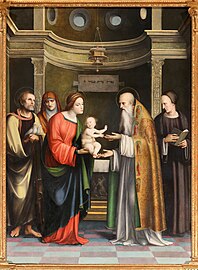Francesco Francia, whose real name was Francesco Raibolini (1447 – 5 January 1517) was an Italian painter, goldsmith, and medallist from Bologna, who was also director of the city mint.[1][2]


He may have trained with Marco Zoppo and was first mentioned as a painter in 1486. His earliest known work is the Felicini Madonna, which is signed and dated 1494. He worked in partnership with Lorenzo Costa, and was influenced by Ercole de' Roberti's and Costa's style. After 1505 he was influenced more by Perugino and Raphael. He had a large workshop and trained Marcantonio Raimondi, Ludovico Marmitta,[3] and several other artists; he produced niellos, in which Raimondi first learnt to engrave, soon excelling his master, according to Vasari. Raphael's Santa Cecilia is supposed to have produced such a feeling of inferiority in Francia that it caused him to die of depression. However, as his friendship with Raphael is now well-known, this story has been discredited.
He died in Bologna. His sons Giacomo Francia and Giulio Francia were also artists.
Works (selection of paintings)
Until 1500
- Crucifixion with St. John and St. Jerome, c. 1485, 52 cm x 33 cm, oil on wood, Palazzo d'Accursio, Bologna
- The Holy Family, c. 1485, 54 cm x 40 cm, oil on wood, Gemäldegalerie, Berlin
- The Virgin and Child with an Angel, c. 1490, 58 cm x 44 cm, oil on wood, Carnegie Museum of Art, Pittsburgh
- Bartolomeo Bianchini,[4] c. 1485–1500, 57 cm x 41 cm, oil on wood, National Gallery, London
- Baptism of Jesus, c. 1490, 29 cm x 55 cm, oil on wood, Calouste Gulbenkian Museum, Lisbon
- Madonna and Child with two Angels, c. 1495, 64 cm x 49 cm, oil on wood, Alte Pinakothek, Munich
- Pala Calcina, 1500, 193 cm x 151 cm, tempera and oil on canvas (formerly wood), Hermitage Museum, Saint Petersburg
- Crucifixion
c. 1485, Bologna - The Holy Family
c. 1485, Berlin - Madonna with Angel
1495-1500, Pittsburg - Bartolomeo Biachini
1485-1500, London - Madonna with Angels
c. 1495, Munich
Years 1500-10
- Madonna and Child, c. 1500, 67 cm x 52 cm, oil on wood, Wallington National Trust, Northumberland
- Madonna and Child with Saints Francis and Jerome,[5] 1500–10, 75 cm x 57 cm, tempera on wood, Metropolitan Museum of Art, New York
- The Annunciation with St. Albert the Carmelite, c. 1503–04, 182 cm x 132 cm, oil on canvas (formerly wood), Musée Condé, Chantilly
- Adoration of the Child, 1500–05, 175 cm x 132 cm, oil on wood, Alte Pinakothek, Munich
- Evangelista Scappi, 1500–05, 55 cm x 44 cm, oil on wood, Uffizi, Florence
- Bishop Altobello Averoldo,[6] c. 1505, 54 cm x 41 cm, oil on wood, National Gallery of Art, Washington
- Crucifixion, c. 1505, 246 cm x 146 cm, oil on wood, San Giacomo Maggiore, Bologna
- The life of Saint Cecilia and her husband Valerian - scene 1 (The Marriage) & 10 (The Burial), 1504–1506, 360 cm x 290 cm, frescoes, Oratorio di Santa Cecilia, Bologna
- Venus and Cupid, 1505–10, 80 cm x 49 cm, oil on wood, Musée des Beaux-Arts de Mulhouse
- Baptism of Jesus, 1509, 209 cm x 169 cm, oil on wood, Gemäldegalerie Alte Meister, Dresden
- Madonna
c. 1500, Northumberland - Adoration of Child
1500-05, Munich - Evangelista Scappi
1500-05, Florence - Altobello Averoldo
c. 1505, Washington - Cecilia / Le Mariage
1504-06, Bologna - Venus and Cupid
1505-10, Mulhouse
After 1510
- The Holy Family, c. 1510, 64 cm x 49 cm, oil on wood, Museum of Fine Arts, Budapest
- Federico Gonzaga (son of Isabella d'Este),[7] 1510, 45 cm x 34 cm, oil on wood transferred to canvas and finally again on wood, Metropolitan Museum of Art, New York
- Portrait likely Isabella d'Este, 1511, 44 cm x 35 cm, oil on wood, Vienna
- Pala Buonvisi,[8] 1510–12, 195 cm x 180 cm, oil on wood, National Gallery, London
- Presentation of Jesus in the temple,[9] 1510–13, 201 cm x 145 cm, oil on wood, Pinacoteca Comunale di Cesena, Italy
- Virgin and the Child and the Infant St. John the Baptist,[10] 1510–15, 65 cm x 51 cm, oil on wood, São Paulo Museum of Art
- Virgin and the Child and the Infant St. John the Baptist (Francesco Francia and sons),[11] c. 1515, 115 cm x 94 cm, oil on wood, National Gallery of Victoria, Melbourne
- Federico Gonzaga
1510, New York - Likely Isabella d'Este
1511, Vienna - Pala Buonvisi
1510-12, London - Presentation of Jesus
1510-13, Italy - Madonna
1510-15, São Paulo - Madonna (Francia & sons)
c. 1515, Melbourne
See also
References
External links
Wikiwand in your browser!
Seamless Wikipedia browsing. On steroids.
Every time you click a link to Wikipedia, Wiktionary or Wikiquote in your browser's search results, it will show the modern Wikiwand interface.
Wikiwand extension is a five stars, simple, with minimum permission required to keep your browsing private, safe and transparent.

















